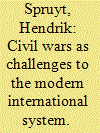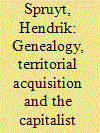| Srl | Item |
| 1 |
ID:
084672


|
|
|
|
|
| Publication |
2008.
|
| Summary/Abstract |
Recent events have led to a renewed scholarly interest in empire and the question whether the United States and its policies abroad constitute an "American Empire." This essay clarifies the various uses of the term and argues that conceptual overstretching retards scholarly analysis of the phenomenon. This essay suggests a definition of the term "empire" and provides an ideal-typical reference point to study its empirical variations. I provide a typology of empires to guide the analysis of common features as well as distinguishing characteristics. We can then answer the question whether contemporary manifestations might differ from their historical precursors. American unilateralist policy today differs in fundamental respects from previous imperial processes and structures. In contradistinction with earlier empires, U.S. policies lack the incentive structures for peripheral elites and local populations that typified imperial rule in the past. While falling short of constituting a formal empire, its policies face the same contradictions that confronted the western maritime empires as well as the USSR and which led to their dismemberment.
|
|
|
|
|
|
|
|
|
|
|
|
|
|
|
|
| 2 |
ID:
155235


|
|
|
|
|
| Summary/Abstract |
The current international system is based on Westphalian principles in which authority is defined territorially. Within this territory, the state has sole jurisdiction. Adherence to these principles has contributed to the decline of interstate war. Conversely, applying these principles and correlated norms to states that gained their independence after 1945 has contributed to civil conflicts. These norms are opaque, as is the case with the principle of self-determination; or they lock in an unstable status quo, as with uti possidetis, the principle that borders inherited at the moment of independence should always be maintained; or they are inconsistently applied and often violated, as with the principle of noninterference. Consequently, they provide poor guidelines as to when, and on which grounds, external intervention in civil wars might be warranted. I argue that the degree to which the combatants challenge Westphalian principles should guide policy responses. Furthermore, the international legal regime should reconsider uti possidetis. In some instances, partition might be a reasonable solution to civil wars.
|
|
|
|
|
|
|
|
|
|
|
|
|
|
|
|
| 3 |
ID:
075322


|
|
|
|
|
| Publication |
2006.
|
| Summary/Abstract |
This essay argues that one can distinguish various generative explanations of the state and the international system. By discussing Benno Teschke's work it examines, and questions, whether the mode of production can be treated as ontologically primary to other domains - the political, military, or ideological spheres. The behavior ascribed to capitalist states as England does not comport with the empirical evidence. Instead this essay suggests that hybrid theories, which privilege no single category of causal variables, can provide more accurate insights. The argument that territorial acquisition and capitalism are antithetical applies more accurately to the advent of the international order of the post-World War II period.
|
|
|
|
|
|
|
|
|
|
|
|
|
|
|
|